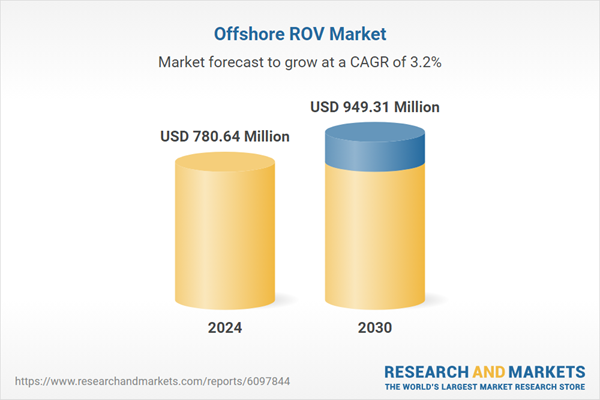Speak directly to the analyst to clarify any post sales queries you may have.
10% Free customizationThis report comes with 10% free customization, enabling you to add data that meets your specific business needs.
The growing emphasis on offshore energy - both conventional oil & gas and renewables - has driven market demand. In particular, the rapid scale-up of offshore wind projects in regions like Europe and Asia-Pacific requires reliable subsea inspection and support services. Concurrently, subsea oilfield developments in the Gulf of Mexico, Brazil, West Africa, and the North Sea continue to fuel deployment. The evolution of high-tech ROVs with AI, advanced sensors, and improved maneuverability is further enhancing their value across industries.
Key Market Drivers
Surge in Deepwater Oil & Gas Exploration
Deepwater exploration activities are significantly accelerating ROV deployment across offshore energy sectors. The number of offshore drilling platforms operating beyond 1,500 meters has surged by more than 40% in the last five years. In 2024, over 120 deepwater fields were operational worldwide, up from 85 in 2019. The count of subsea tiebacks and remote installations has surpassed 300, compared to just 180 previously. This expansion has doubled ROV-based maintenance operations annually, especially in hotspots such as Brazil and the Gulf of Mexico. The demand for ROVs capable of operating below 3,000 meters has jumped by 60%, with some platforms now drilling in depths over 50% deeper than in 2018. This growth highlights a substantial rise in subsea assets requiring precise, real-time ROV intervention, solidifying their role in modern offshore operations.Key Market Challenges
High Operational Complexity and Maintenance Costs
Offshore ROV operations are inherently complex and capital-intensive. These systems incorporate advanced technologies like multi-axis manipulators, high-resolution imaging, and deepwater propulsion units, all of which require rigorous maintenance. Operating expenses can be steep, with 20-30% of total costs allocated to spare parts and servicing. Unexpected system failures during offshore deployments can cause downtime losses ranging from USD 10,000 to USD 30,000 per day, depending on vessel rates. With typical deployments exceeding 250 days per year, wear and tear on components like umbilicals and thrusters is common. While predictive maintenance programs can reduce downtime by up to 40%, they require additional capital investment and expertise. Balancing high-tech capabilities with operational budgets remains a key challenge for industry players.Key Market Trends
Growth of the Offshore Renewables Opportunity
The expansion of offshore wind capacity is reshaping ROV market dynamics. Offshore wind installations have surpassed 45 GW globally, with 20 GW added in 2023 alone. ROVs are increasingly used for tasks such as turbine foundation inspection, cable route surveys, and scour protection maintenance. Average missions per wind farm have doubled since 2019, now exceeding 20 annually. ROVs capable of advanced operations, including turbine blade inspection and marine ecological monitoring, are in high demand. This has prompted investment in agile, high-thrust ROV variants optimized for shallow to medium-depth operations (50-200 meters). As offshore renewables grow, ROV providers are developing application-specific models tailored to evolving operational needs and environmental standards.Key Market Players
- Teledyne Technologies Incorporated
- Kongsberg Gruppen ASA
- Oceaneering International, Inc.
- Fugro Group
- Saipem S.p.A.
- Subsea7 S.A.
- General Dynamics Mission Systems, Inc.
- ATLAS ELEKTRONIK GmbH
Report Scope:
In this report, the Global Offshore ROV Market has been segmented into the following categories, in addition to the industry trends which have also been detailed below:Offshore ROV Market, By Propulsion System:
- Hybrid System
- Electric System
- Mechanical System
Offshore ROV Market, By Depth:
- Less Than 5,000 Feet
- 5,000-10,000 Feet
- Above 10,000 Feet
Offshore ROV Market, By Application:
- Drilling & Well Completion Support
- Construction Support
- Inspection
- Repair & Maintenance Service
- Subsea Engineering Services
- Others
Offshore ROV Market, By Region:
- North America
- United States
- Canada
- Mexico
- Europe
- Germany
- France
- United Kingdom
- Italy
- Spain
- South America
- Brazil
- Argentina
- Colombia
- Asia-Pacific
- China
- India
- Japan
- South Korea
- Australia
- Middle East & Africa
- Saudi Arabia
- UAE
- South Africa
Competitive Landscape
Company Profiles: Detailed analysis of the major companies present in the Global Offshore ROV Market.Available Customizations:
With the given market data, the publisher offers customizations according to a company's specific needs. The following customization options are available for the report.Company Information
- Detailed analysis and profiling of additional market players (up to five).
This product will be delivered within 1-3 business days.
Table of Contents
Companies Mentioned
- Teledyne Technologies Incorporated
- Kongsberg Gruppen ASA
- Oceaneering International, Inc.
- Fugro Group
- Saipem S.p.A.
- Subsea7 S.A.
- General Dynamics Mission Systems, Inc.
- ATLAS ELEKTRONIK GmbH
Table Information
| Report Attribute | Details |
|---|---|
| No. of Pages | 185 |
| Published | June 2025 |
| Forecast Period | 2024 - 2030 |
| Estimated Market Value ( USD | $ 780.64 Million |
| Forecasted Market Value ( USD | $ 949.31 Million |
| Compound Annual Growth Rate | 3.1% |
| Regions Covered | Global |
| No. of Companies Mentioned | 8 |









